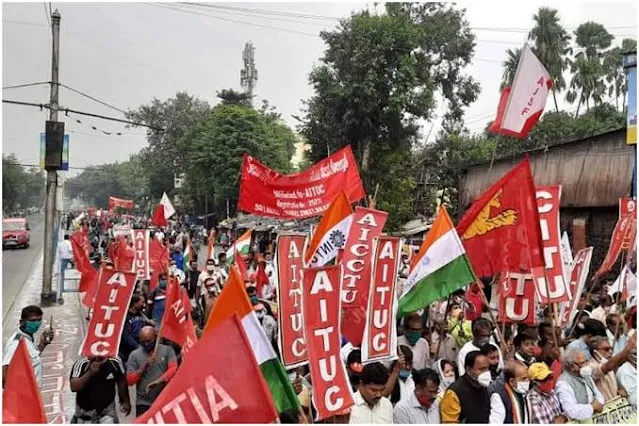Massive national strike on July 9: Trade unions claim participation of over 250 million workers and farmers
A nationwide general strike called by a joint platform of central trade unions and sectoral federations claimed participation by more than 25 crore (250 million) workers, farmers, and agri-labourers across India. The strike, protests, and related blockades—popularly known as Rasta Roko and Rail Roko—affected both formal and informal sectors and saw significant mobilization in rural and urban areas alike.
According to a preliminary report released by the organising unions, the strike drew support from employees across public sector undertakings, government departments, industrial belts, and unorganised labour groups. It also claimed visible participation of students, youth, women, and social activists in various states.
Widespread Industrial Participation
Organisers listed participation from workers in coal, steel, petroleum, electricity, telecom, postal, atomic energy, ports, banks, insurance, and public transport. Several employees of multinational corporations, according to union leaders, also joined the action through demonstrations and processions in industrial areas.
Employees from sectors such as defence, railways, NMDC, construction, cement, and mining (including bauxite, copper, gold, and aluminium) reportedly participated in varying forms. While defence sector workers did not strike outright, they reportedly staged one-hour demonstrations before joining duty.
Scheme workers, including Anganwadi, ASHA, Mid-Day Meal workers, as well as domestic workers, fisherfolk, hawkers, and self-employed persons, were also part of the mobilisations. Unions stated that there was notable support from informal sector workers including rickshaw and taxi drivers, beedi workers, and contract labourers.
Regional Impact and Bandh-like Situations
The organisers reported a “Bandh-like” situation in parts of Puducherry, Assam, Bihar, Jharkhand, Tamil Nadu, Kerala, Punjab, West Bengal, Odisha, Karnataka, Goa, and several northeastern states. Partial shutdowns were said to have occurred in sections of Rajasthan, Haryana, Telangana, and Andhra Pradesh.
Reports of industrial strikes also came in from Madhya Pradesh, Maharashtra, Uttar Pradesh, Uttarakhand, and Gujarat. However, comprehensive updates from all states were still awaited as of the release of the statement.
Allegations Against Government Policies
The unions voiced strong opposition to what they described as “anti-labour, anti-people” policies of the central government. They criticised the National Monetisation Pipeline (NMP), alleging that it amounts to a sell-off of national assets to corporates, threatening India's economic sovereignty.
The statement raised concerns over increasing unemployment, rising living costs, and lack of labour protections, particularly under the four new labour codes. Union leaders argued that the new codes dilute hard-won labour rights, restrict union activities, reduce wage protections, and expand the scope for fixed-term employment and contractorisation.
They also criticised the government’s employment practices, alleging a deliberate move to replace regular jobs with temporary positions, apprenticeships, and re-employment of retirees. The strike also sought attention to vacancies in government departments and PSUs, calling for immediate recruitment and job creation, including an urban employment guarantee act.
Democratic Rights and Labour Forums
Further, the unions condemned what they called a broader crackdown on democratic rights. They cited the lack of Indian Labour Conference meetings in the past decade, alleged disenfranchisement of migrant workers, and proposed laws such as Maharashtra’s Public Security Bill as indications of democratic backsliding.
At a rally held at Jantar Mantar, New Delhi, union leaders from 10 central trade unions addressed striking workers. Among the speakers were Ashok Singh (INTUC), Amarjeet Kaur (AITUC), Harbhajan Singh (HMS), Tapan Sen (CITU), Rajiv Dimri (AICCTU), Lata Ben (SEWA), Chaurasia (AIUTUC), Jawahar (LPF), Dharmendra Verma (TUCC), and R S Dagar (UTUC). Representatives from independent federations and agricultural labour unions, including AIKS, also spoke.
Way Ahead
Calling the July 9 strike a “grand success,” union leaders described it as the beginning of a larger, prolonged battle. They indicated that sector-specific agitations would continue, building toward a larger national movement aimed at reversing current government policies and restoring labour and social protections.


Comments